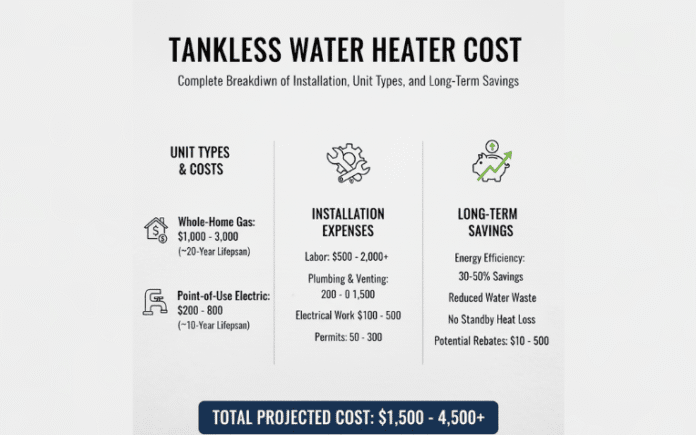Table of Contents
Tankless Water Heater Cost
Tankless water heaters have quickly become one of the most sought-after home upgrades for homeowners seeking better energy efficiency and consistent hot water on demand. Unlike traditional tanks that heat large volumes of water continuously, tankless systems operate only when hot water is needed. This shift in technology raises one big question: how much does it actually cost to own one?
Understanding Tankless Water Heater Cost requires more than just looking at the unit price. A fair cost assessment must include equipment selection, installation labor, fuel type, maintenance expectations, and lifetime savings. By examining each layer of expense clearly, homeowners can determine whether investing in a tankless system is a financial win or simply an attractive luxury.
| Category | Average Cost / Savings | What’s Included | Key Notes |
| Unit Price | $500 – $2,500 | Gas or electric tankless heater | High-efficiency or gas-powered models cost more |
| Installation Fees | $1,000 – $3,000 | Labor, venting, gas/electrical upgrades | Retrofitting older homes increases cost |
| Annual Energy Savings | $100 – $300 per year | Lower utility bills vs. traditional tank models | Best savings in high hot-water usage homes |
| Maintenance Expenses | $100 – $200 per year | Descaling, flushing, and filter replacement | Hard water areas require more frequent service |
| Pros | Lower long-term energy use, endless hot water, compact design | Space-saving & eco-friendly | Boosts home resale value |
| Cons | High upfront investment, installation complexity | May require gas line or electrical upgrades | Delayed ROI if hot water usage is low |
| Estimated Lifespan | 15 – 20 years | Long-term durability | Can last twice as long as traditional tanks |
| ROI Timeframe | 5 – 10 years | Payback through energy savings | Faster ROI in large households |
Initial Purchase Price: Gas vs Electric Units
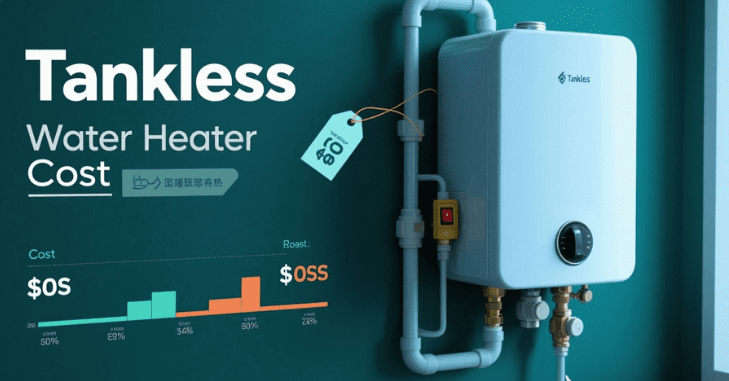
Not all tankless systems are priced the same, and the first major cost decision begins with choosing between electric or gas-powered systems. Electric models are more affordable upfront, but gas heaters typically offer higher flow rates for larger households.
Typical Price Ranges
- Electric Tankless Heater Units: $500 to $1,500
- Gas Tankless Heater Units (Non-Condensing): $1,000 to $2,000
- High-Efficiency Gas Condensing Models: $1,500 to $3,000
Electric models are best suited for smaller homes or single-user applications, while gas units can support multi-bath family households without temperature drop.
Installation Fees and Labor Factors
A significant portion of the total expense lies not in the heater itself but in the installation process. A professional setup is essential because improper ventilation or electrical wiring can lead to inefficiency or significant safety risks.
Key Installation Cost Variables
- Electrical Upgrades (For Electric Units): Panel upgrades or circuit additions may add $300 to $1,200
- Gas Line Extension (For Gas Units): $500 to $1,500, depending on distance from supply
- Venting and Exhaust System: Stainless steel vent kits range from $250 to $600
- Professional Labor Charges: $800 to $2,500, depending on region and complexity
Simple replacements of older tank systems with tankless systems using existing utility lines stay at the lower end of the cost range, while retrofits in older homes climb rapidly.
Real-World Cost Breakdown Table
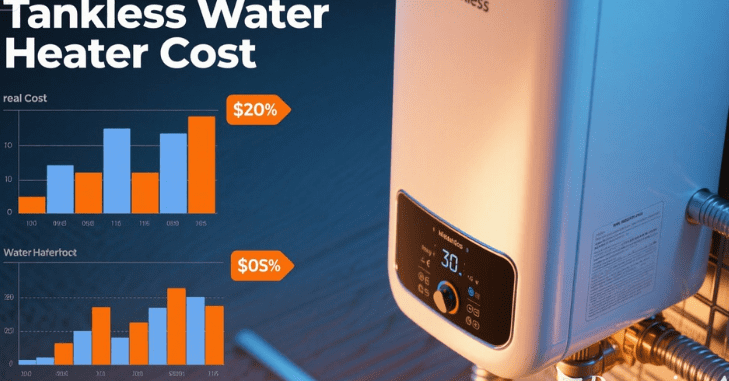
| Expense Category | Electric Tankless Heater | Gas Non-Condensing Heater | Gas Condensing Heater |
| Unit Price | $500 – $1,500 | $1,000 – $2,000 | $1,500 – $3,000 |
| Installation Labor | $800 – $1,500 | $1,000 – $2,500 | $1,200 – $2,800 |
| Electrical/Gas Upgrades | $300 – $1,200 | $500 – $1,500 | $500 – $1,500 |
| Venting/Exhaust System | Not Required | $250 – $600 | $300 – $800 |
| Total Installed Cost Range | $1,600 – $4,200 | $2,750 – $6,600 | $3,500 – $8,100 |
Energy Savings and Monthly Utility Reductions
Tankless systems are celebrated for efficiency claims — but how much do they really save? According to performance estimates from major brands, tankless heaters reduce energy consumption by 24% to 34% compared to storage-style tanks. Savings depend on household size and daily water demand.
Potential Long-Term Savings
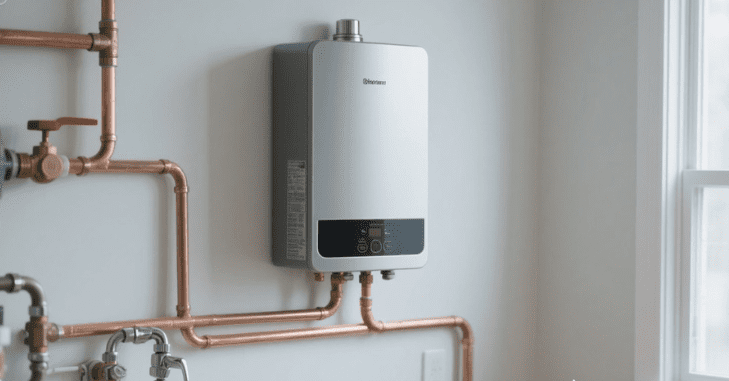
- Single or Couple Household: $80 to $150 annual utility savings
- Family of Four: $150 to $300 yearly savings
- Large Families or High Usage Homes: Up to $400 annually
These numbers stack significantly across the lifespan, especially since tankless heaters last considerably longer.
Lifespan and Return on Investment
Traditional tank heaters typically survive 8 to 12 years, whereas tankless systems often exceed 20 years with proper maintenance. Even when factoring in higher upfront costs, long-term durability increases ROI potential.
Pros and Cons from a Financial Point of View
Advantages
- Lower monthly energy bills
- Endless hot water for multiple taps
- Space-saving wall-mounted design
- Longer lifespan → delayed replacement cost
Drawbacks
- Higher upfront investment
- May require costly gas or electrical panel upgrades
- Slow payback period in low-usage households
Maintenance Expenses and Annual Care
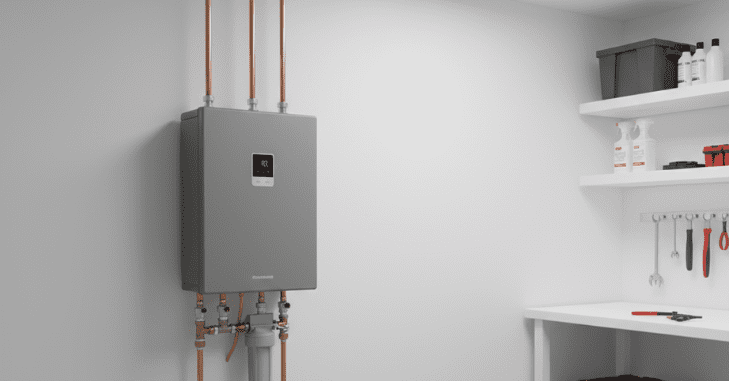
Tankless heaters are not maintenance-free. To maintain peak efficiency, descaling and flushing are recommended yearly, especially in hard water regions.
Typical Maintenance Requirements
- Professional Flush Service: $150 to $250 annually
- DIY Vinegar Flush Kits: $30 to $60
- Filter Replacements (if included): $20 to $50 yearly
Skipping maintenance risks mineral buildup that reduces flow and forces premature repairs.
When a Tankless System Pays for Itself
Financial payback varies widely based on water usage and fuel type. For a high-demand gas heater in a family of four, energy bill savings combined with increased system lifespan often deliver full ROI in 8 to 12 years — well within the expected 20-year lifespan. However, for low-demand single users, electric heaters offer shorter ROI timelines by avoiding costly fuel upgrades.
Best Situations for Maximum Value
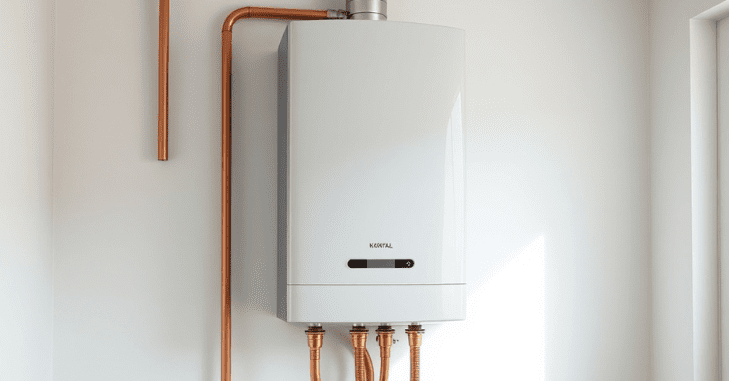
Households experiencing constant shortages of hot water gain the most immediate satisfaction from resolving the issue. Homes planning to stay put for at least 10 years see the clearest economic return. Real estate value also increases modestly since energy-efficient systems are attractive to buyers.
Final Evaluation
Tankless water heaters are not a universal money-saving shortcut; instead, they are a strategic investment that delivers actual value in homes with long-term occupancy and high usage. Their long lifespan, compact footprint, and efficiency perks make them particularly rewarding for families and performance-minded homeowners.
However, buyers must carefully weigh installation costs and utility upgrades before committing. In many cases, selecting the wrong unit type or ignoring maintenance can erase potential savings.
Conclusion
A tankless water heater is a smart financial move when chosen according to household needs rather than hype. Those focused on energy efficiency, continuous hot water, and long-term ROI will find that the initial investment pays off, not instantly, but steadily across decades. Short-term buyers or low-usage individuals may not recover the costs as quickly, but the convenience and longevity of tankless systems often become just as valuable as the savings.
Want to know about Water Heater Selection: Design Considerations for Modern Bathrooms Check out our Home Improvement category.
FAQs
Some regions offer tax credits or rebates for energy-efficient appliances, including tankless water heaters. Check local programs for eligibility.
Most manufacturers provide a warranty ranging from 5 to 15 years, depending on the model and installation.
Regular maintenance is recommended, which can cost around $150 to $300 annually. This includes descaling the unit to prevent mineral buildup.
Homeowners can save 20-30% on energy costs, depending on usage and local energy rates.

